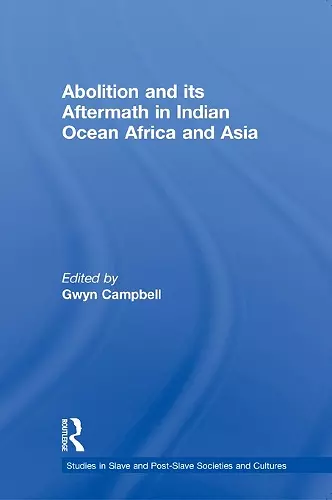Abolition and Its Aftermath in the Indian Ocean Africa and Asia
Format:Paperback
Publisher:Taylor & Francis Ltd
Published:19th Sep '12
Currently unavailable, and unfortunately no date known when it will be back
This paperback is available in another edition too:
- Hardback£160.00(9780714655031)

This important collection of essays examines the history and impact of the abolition of the slave trade and slavery in the Indian Ocean World, a region stretching from Southern and Eastern Africa to the Middle East, India, Southeast Asia and the Far East.
Slavery studies have traditionally concentrated on the Atlantic slave trade and slavery in the Americas. In comparison, the Indian Ocean World slave trade has been little explored, although it started some 3,500 years before the Atlantic slave trade and persists to the present day. This volume, which follows a collection of essays The Structure of Slavery in Indian Ocean Africa and Asia (Frank Cass, 2004), examines the various abolitionist impulses, indigenous and European, in the Indian Ocean World during the nineteenth and twentieth centuries. It assesses their efficacy within a context of a growing demand for labour resulting from an expanding international economy and European colonisation.
The essays show that in applying definitions of slavery derived from the American model, European agents in the region failed to detect or deliberately ignored other forms of slavery, and as a result the abolitionist impulse was only partly successful with the slave trade still continuing today in many parts of the Indian Ocean World.
"Research on the slave trade and its abolition in the Indian Ocean world of Africa and Asia remains slight in comparison to examination of the Atlantic slave trade. In this work, Campbell (history, McGill U., Canada) presents 12 history essays that go some small ways towards filling this gap. The geographic scope includes Mauritius, Madagascar, Somalia, Iran, Saudi Arabia, India, and the Philippines and the issues discussed include the relationship of movements towards abolition to such factors as: the growth of international industrialization, demographic labor trends, indigenous resistance to slavery, slave runaways and revolts, Western influences, and other sources of unfree labor such as penal labor and indentured servitude." --Reference & Research Book News
ISBN: 9780415645607
Dimensions: unknown
Weight: 440g
240 pages